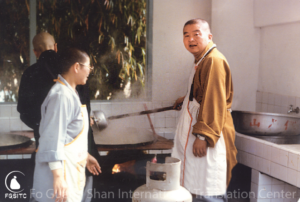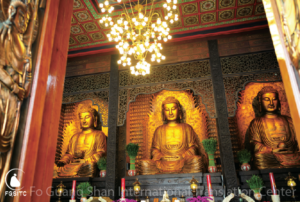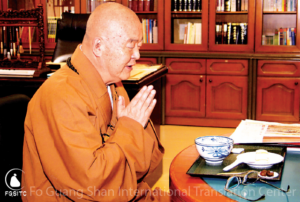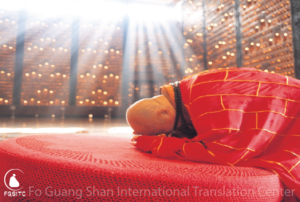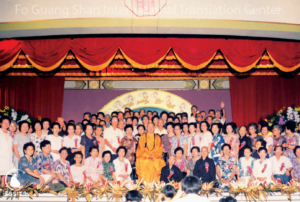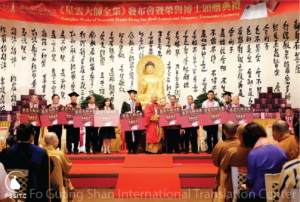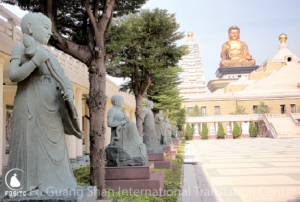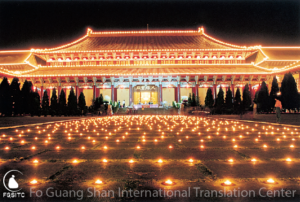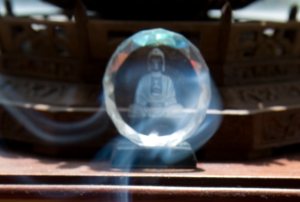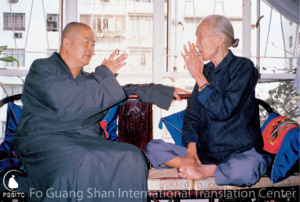Highlights from the book I Am Not a Monk “Sponging Off” Buddhism, by Venerable Master Hsing Yun
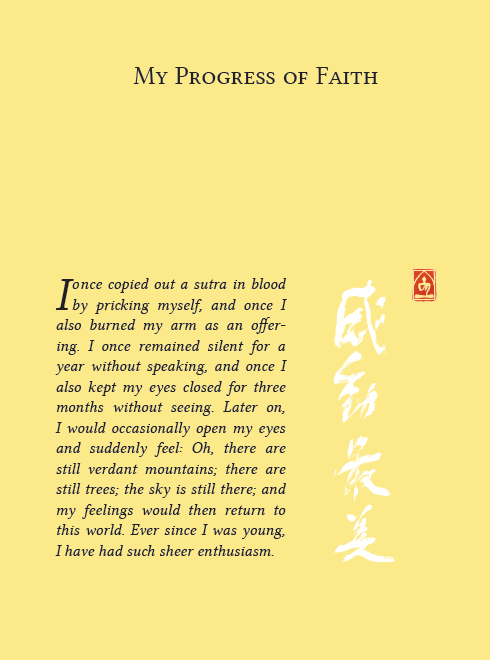
My Progress of Faith
I once copied out a sutra in blood by pricking myself, and once I also burned my arm as an offering. I once remained silent for a year without speaking, and once I also kept my eyes closed for three months without seeing. Later on, I would occasionally open my eyes and suddenly feel: Oh, there are still verdant mountains; there are still trees; the sky is still there; and my feelings would then return to this world. Ever since I was young, I have had such sheer enthusiasm.
- Activities at Temples: Nurturing a Foundation for Faith
During my childhood, I did not have any religious sentiments, nor did I have much faith. I simply accompanied my maternal grandmother as she made the rounds at the temples.
I could leave the house and played around in the temples. There were also candies and snacks that I could eat. I can only say that my childhood was spent in such an environment, which nurtured some small foundation for my religious faith.
Due to the reasons mentioned above, there were those who saw me, a small child in the Buddha Hall, and out of respect for my maternal grandmother, they naturally showed some kindness and care toward me as well. They would frequently say to me with a merry laugh, “Ah, you are quite like a ‘little monk.’”
I did not know what it meant to be a “little monk” or why they called me a “little monk.” Moreover, someone later on said, “Your facial expression is very auspicious,” and “You have the roots of goodness.” These many words of praise made me feel that becoming a “little monk” was something quite good indeed.
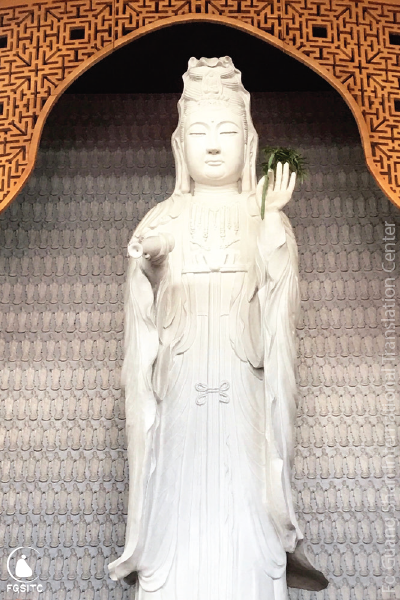
Avalokitesvara Bodhisattva in the Great Compassion Shrine, Fo Guang Shan.
What evokes the most profound memory during this period of time, was the effort my maternal grandmother put into her spiritual practice.
It goes without saying that she would burn incense in the mornings and change the offering bowls of water in the evenings, but in particular, she would sit in meditation on her bed in the middle of the night.
I remember there was one time, a dozen or so eminent monks sat in the small hall of my maternal grandmother’s home. I was not afraid of them, but knowing that these many eminent monks were so prestigious, dignified, and so holy as if they were not to be intruded upon, I leaned against the doorway full of curiosity, observing them and sizing them up.
At that time, some of the eminent monks also saw me, and one said, “Little kid, you are just like a little monk. Do you want to become a monk?” I do not know where my courage came from, but I said to them, “I do.” He replied, “Okay, if you want to become a monk, you must formally become the disciple of a master first. Look at us here, which one do you want to acknowledge as your master?” I simply went over to the side of one of the eminent monks in a mischievous sort of way and pointed at him, meaning that I would formally acknowledge him as my master.
He said, “Then good, we will conduct the tonsure ceremony for acknowledging the master right here today. We will let this master accept you as a little monk.”
I remember in the Buddha Hall, the candles were blazing, and incense was burning in the incense burner; there were also some offerings of food, flowers and fruits for conducting the great ceremony of acknowledging the master. It was at that very moment that I suddenly asked, “What happens to me after I acknowledge the master?”
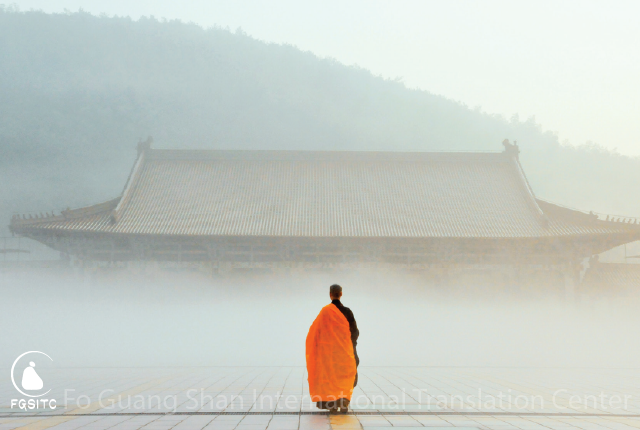
Dharma is not seeking from outside; when you find the inherent mind, bodhi is right before you.
Photo by Zhou Yun
He replied, “Then you will come with us!” I had no idea where we would go, so naturally I dared not just leave with them. At that moment, there was some hesitation in my mind, so I asked, “If I go with you, will my grandma be going with me?”
He said, “She need not go.” My heart sank as soon as I heard this. [I thought:] Without the protection of my grandma, where am I going with you by myself?
I asked again, “Will my mom be going with me?” He said, “She won’t be going either.”
I further asked about my sister who was three years older than me. At the time, she was already thirteen or fourteen years old and was a young lady. In my eyes, she had always been capable and experienced, and perhaps somewhat fierce, for no one was able to impose upon her. I said, “Can my older sister go with me?” He said once again, “She won’t be going either.”
As soon as I heard this, I said petulantly, “Then I won’t go either.”
That was how the whole ridiculous farce ended. Having finished their meal, they strode out and left. The matter of becoming a monk also vanished like mist after this, and it seemed that no one ever mentioned it again.
As to how my family felt at the time, I have no idea. However, I guess perhaps they only wanted me to acknowledge a master and form positive connections with those many eminent monks; they didn’t really want me to go and become a monk. Thus, after that, no one ever mentioned it again.
Chapter subheadings:
- Wholesome and Unwholesome Karma: The Inevitable Principle of the World
- Activities at Temples: Nurturing a Foundation for Faith
- A Nation at War: Young and Old Are Mobilized to Resist Japan
- In Dire Peril of Life and Death: Giving Rise to the Source of Energy for Faith
- Searching for Father, Promising the Venerable to Join the Monastic Order
- Worshipping Guanyin, Illumination of the Mind and the Enhancement of Wisdom
- Paying Homage to the Buddha and Reciting the Buddha’s Name, Vowing to Contribute by Practicing the Buddha’s Way
- Propagating the Dharma for the Benefit of Sentient Beings, Emulating the Examples of Patriarchs through the Ages
- Plowing and Weeding with Great Effort, Achievement through Wondrous Causes and Conditions
- The Resolve of the Volunteers, Support from Bodhisattva Manifestations
- Increase the Gain for One Another, Greater and Lesser Vehicles Mentoring Each Other
- Sending Others Warmth in the Cold of Winter, Hardship Fosters Strength
- Faith Is Priceless, for External Objects Cannot Make One Waver
- When Devotees Make Resolve, Bodhisattvas Are in the Human World
- A Crowd of a Million People, a Long-Term Response for Running a School
- Providing People with Causes and Conditions, Together We Shine Brightly
- An Inexhaustible Treasure Awaits Everyone’s Exploration
- Resonating with the Buddha, Practicing Humanistic Buddhism Diligently
The Author’s Preface, Forewords, Afterword, and Chinese Editor’s Remarks are available to read online.

